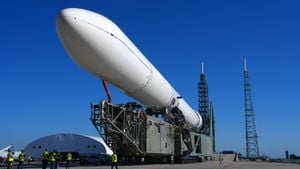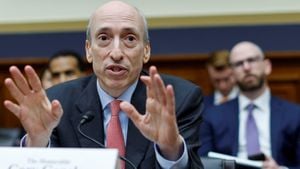Japan's nuclear watchdog made headlines this week with its unprecedented decision to disqualify the Tsuruga No. 2 reactor, marking the first such rejection under post-Fukushima safety standards. This ruling by the Nuclear Regulation Authority (NRA) casts doubt on the nation’s efforts to reestablish nuclear power as a key player in its energy strategy following the devastating Fukushima disaster.
The announcement came as officials noted the reactor's operator, Japan Atomic Power Co. (JAPC), failed to adequately address disturbing safety concerns linked to detected active fault lines beneath the facility. Situated on the Sea of Japan coast within Fukui Prefecture, Tsuruga No. 2 has now been pronounced "unfit" for operation, prompting major setbacks for Japan's nuclear energy ambitions.
NRA Chairperson Shinsuke Yamanaka, during the press conference, emphasized the rigorous examination leading to this verdict, labeling the review process as "abnormal" due to numerous setbacks caused by data inaccuracies and oversights from JAPC. "We reached our conclusion based on very strict examination," Yamanaka stated, underscoring the need for stricter safety compliance moving forward.
This decision is particularly disheartening for JAPC, who had pinned hopes on restarting Tsuruga No. 2 as it moves to decommission its older plant, Tsuruga No. 1. The company must now decide whether to challenge the ruling, which seems increasingly difficult considering the stringent requirements mandated by the NRA.
Under existing nuclear safety protocols established post-Fukushima, the NRA concluded three months ago the possibility of active fault lines stretching below Tsuruga No. 2 could not be ignored. This raised alarm bells about its potential susceptibility to seismic activity, which is particularly relevant for Japan, one of the most quake-prone regions globally.
The Tsuruga No. 2 reactor, which began commercial operations back in February 1987, has remained offline since the 2011 Fukushima incident, where safety protocols were significantly tightened. Despite JAPC's claims concerning the stability of the fault lines, experts warn against the risks of having key nuclear infrastructure near active geological formations.
This latest setback arrives amid Japan's renewed commitment to maximizing its nuclear power usage, particularly as the government seeks to secure energy stability and achieve carbon neutrality targets by 2050. Prime Minister Fumio Kishida’s administration has initiated plans to reboot various nuclear plants, and the Tsuruga decision raises pertinent questions about the feasibility of these ambitions.
Japan’s government’s response to the situation aligns with the emphasis on safety protocols, as Chief Cabinet Secretary Yoshimasa Hayashi reiterated the imperative of safeguarding public health and safety before pursuing energy production. While the government respects the thorough scientific decision made by the NRA, the push for nuclear energy continues.
The backdrop of this ruling also features disquiet stemming from recent earthquakes impacting Japan's infrastructure. A magnitude 7.5 earthquake on New Year's Day this year devastated many structures and tragically claimed over 400 lives, amplifying concerns over nuclear safety and preparedness.
While Tsuruga No. 2's disqualification doesn’t lead to immediate decommissioning—since the reactor has been out of operation and with spent fuel safely cooled—the future seems bleak for this facility. Any potential reapplications to revive its operation would demand comprehensive proof of fault stability and enhanced safety measures across the plant’s infrastructure.
Understanding the Tsuruga reactor's significance requires acknowledging Japan's historical reliance on nuclear energy; prior to Fukushima, nuclear plants accounted for about 30% of the country's electricity production. Currently, of the 50 commercial reactors across Japan, 27 have sought restart approvals. Only 17 have met the post-Fukushima standards to resume operations, leaving the energy sector at a crossroads.
Japan Atomic Power Co. has expressed its disappointment over the NRA's ruling, describing it as "extremely regrettable". The company reassured its readiness to pursue all necessary measures for eventual reactivation, yet the uphill challenges it faces concerning geological assessments and compliance with stringent safety regulations make the path to reopening uncertain.
Meanwhile, the NRA's ruling has cast new light on Japan's pre-2011 business-as-usual attitude toward nuclear safety. Safety regulations explicitly prohibit any construction of nuclear facilities over active faults. This underlined regulatory shift emerged as Japan grappled with its energy-generation strategies. The recent ruling not only reaffirms the lessons learned from the trauma of Fukushima but also sets the tone for the rigorous oversight to which future reactor applications will be subjected.
The review of Tsuruga No. 2 serves as both a regulatory milestone and cautionary tale for Japan’s atomic energy future. Amid global climate change initiatives and aspirations for energy sustainability, the nuclear discourse remains contentious and fraught with historical and contemporary challenges. Safety, it seems, is positioned as the ultimate priority as Japan navigates its complex relationship with nuclear energy post-Fukushima.
This situation continues to evolve, reflecting broader debates over energy strategy, safety protocols, and the historical weight of Fukushima. The NRA's decision isn't merely about one reactor; it's emblematic of the broader metamorphosis occurring within the nation's nuclear policy framework, where safety must reign supreme.



